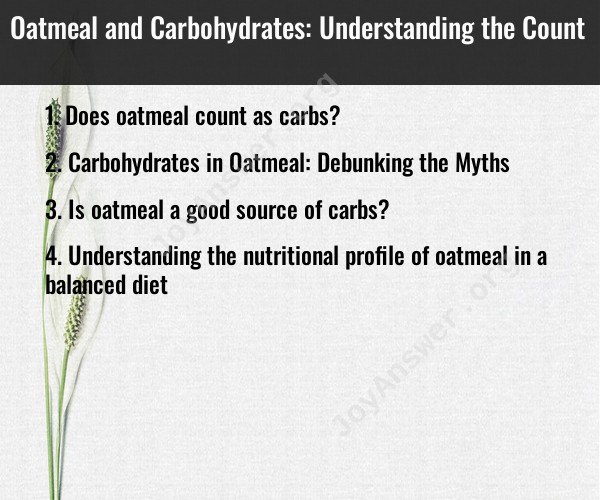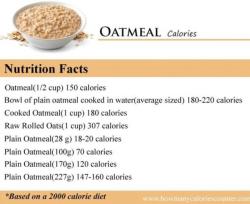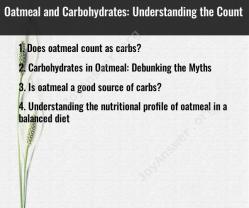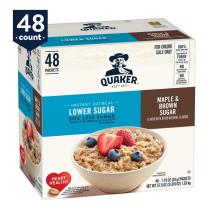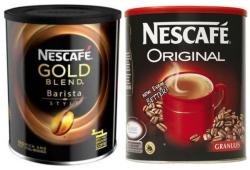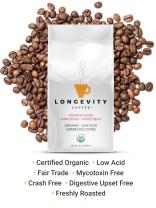Does oatmeal count as carbs?
Yes, oatmeal does contain carbohydrates. Oatmeal is primarily composed of carbohydrates, making it a good source of energy. The type and amount of carbohydrates in oatmeal can vary based on the specific type of oats used and any added ingredients.
The main types of carbohydrates found in oatmeal include:
Complex Carbohydrates: Oatmeal is rich in complex carbohydrates, particularly in the form of starch. Complex carbohydrates take longer to break down in the digestive system, providing a sustained release of energy.
Dietary Fiber: Oats are also high in dietary fiber, which is a type of carbohydrate that is not fully digested. Fiber has various health benefits, including promoting digestive health and helping to manage blood sugar levels. Oatmeal contains both soluble and insoluble fiber.
It's important to note that the carbohydrate content of oatmeal may vary depending on factors such as the type of oats (e.g., old-fashioned oats, instant oats, steel-cut oats) and any additional ingredients or toppings. For example, flavored instant oatmeal packets may contain added sugars, increasing the total carbohydrate content.
If you are monitoring your carbohydrate intake, it's advisable to check the nutrition label on the packaging of the specific oatmeal product you are consuming. The label will provide detailed information on the total carbohydrates, dietary fiber, and sugars per serving.
Despite being a carbohydrate-rich food, oatmeal is often considered a nutritious and healthy choice due to its high fiber content, vitamins, and minerals. Many health experts recommend incorporating whole grains like oats into a balanced diet for their nutritional benefits.
Carbohydrates in Oatmeal: Debunking the Myths
Oatmeal, a breakfast staple often associated with health and weight management, can spark confusion around its carbohydrate content. Let's break down the myths and understand how oatmeal's carbs fit into a balanced diet.
1. Myth Busters:
Myth: Oatmeal is all carbs and bad for you.
Fact: While oatmeal is a good source of carbohydrates, it's also packed with valuable nutrients like fiber, protein, vitamins, and minerals.
Myth: All carbs in oatmeal are bad carbs.
Fact: Oatmeal contains a mix of complex and simple carbs. Complex carbs, like starch, release energy slowly, whereas simple sugars like fructose provide a quick energy boost. However, the fiber in oatmeal significantly slows down the absorption of both types of carbs, preventing blood sugar spikes.
Myth: You should avoid oatmeal on a low-carb diet.
Fact: Certain oatmeal varieties like Old Fashioned Oats can fit into a low-carb diet, especially when paired with protein and healthy fats. Choose varieties with lower net carbs (total carbs minus fiber) and monitor your portion sizes.
2. Understanding Oatmeal's Carb Profile:
Here's a breakdown of carbs in a ½ cup (dry) serving of Old Fashioned Oats:
- Total Carbs: 27 grams
- Net Carbs: 23 grams (due to the presence of 4 grams of fiber)
- Sugars: 4 grams (mostly naturally occurring, with minimal added sugars)
3. Oatmeal in a Balanced Diet:
Oatmeal can be a healthy part of a balanced diet for several reasons:
- High in Fiber: Promotes digestive health, satiety, and blood sugar control.
- Good Source of Protein: Contributes to muscle building and repair, and enhances satiety.
- Packed with Vitamins and Minerals: Provides essential nutrients like manganese, phosphorus, magnesium, and B vitamins.
- Versatile and Customizable: Adapts to various taste preferences and dietary needs.
Key Takeaways:
- Oatmeal's carbs can be part of a healthy diet, especially when focusing on varieties with higher fiber and lower net carbs.
- Pair oatmeal with protein and healthy fats to balance blood sugar and extend satiety.
- Understand your individual needs and dietary goals when making choices about carbohydrate intake.
Remember, moderation and balance are key. Enjoy oatmeal as part of a diverse and nutritious diet and reap its many benefits!
Feel free to ask if you have any further questions about specific oatmeal varieties, carb counting strategies, or incorporating oatmeal into your dietary plan.
